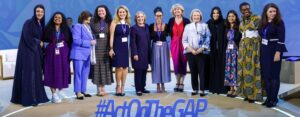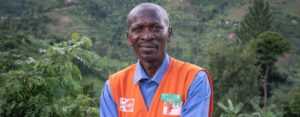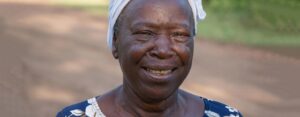This year’s UN climate conference, underway in the United Arab Emirates’ largest city, Dubai, opened its second full week hearing a diverse cross-section of women leaders and activists raise their voices to call for ending existing gender gaps and mitigating the worsening impacts of climate change on women and girls.
Prevailing gender norms, existing inequalities and their unequal participation in decision-making processes often prevent women from fully contributing to climate solutions. Worryingly, a report launched today by UN Women suggests that by 2050, climate change may push up to 158 million more women and girls into poverty and see 236 million more face food insecurity.
But there is hope, however, as women can – and do – play an important role in climate solutions, as was highlighted on ‘Gender Equality Day’ at COP28, where women changemakers showcased how they are driving the action.
A panel discussion on the ‘Women Rise for All’ platform was organized by the UN Office of Partnerships at Creator Hub, underscored the leadership of women in scaling up sustainable solutions aligned with the Paris Agreement.
Women leading climate action
“Women stand at the forefront of the climate battle. Whether as the scientists, legislators, indigenous leaders, youth activists, they are fighting to keep the 1.5 degrees Celsius target alive,” UN Deputy Secretary-General Amina Mohammed said in her video remarks.
Echoing that sentiment, Jemimah Njuki, Chief, Economic Empowerment at UN Women said: “In spite of them not having the resources, we are also seeing a lot of actions led by women and girls and if we can give them the resources – including the financial resources – to do more, I think our world is going to be better for it.”
Women panelists pointed out they will be closely tracking the progress in climate negotiations at COP28, particularly on the issue of funding for just energy transition, ‘phasing out’ of fuels and ‘phasing in’ of clean energy.
“Women continue to drive ambitious climate action more than everywhere, including in their communities, cites, countries and regions,” the deputy UN chief underscored.
In line with the theme of the day, events highlighted how women are bringing solutions, saving lives, and protecting livelihoods, and some of these solutions are driving change thousands of miles away from the conference venue.
UN Women Executive Director Sima Bahous said: “The rights of women and girls must be at the center of climate action, including here at COP28. We must ensure that women have a seat at the decision-making table.”
“We must strengthen inclusive decision-making so that the voices of feminists, youth, indigenous and other grassroot movements can be heard loud and clear from the local to the global level,” she added.

Climate crisis ‘not gender-neutral’
Greg Puley, climate lead for the UN humanitarian affairs office, OCHA, head told delegated that it was a “grave injustice” that people on the frontlines of the climate crisis who were least responsible for it, too often found themselves “at the back of the line” for climate funding.
The climate crisis is not gender-neutral, he added, urging donors and humanitarians to remain “laser-focused” on the differentiated needs of women and girls in the aid response.
Pushing for real equality
Ignacia de la Rosa, a leader of the San Antero community in the Cispatá region of Colombia, has been working for several years on a ‘blue carbon’ project aimed at conserving and restoring coastal mangrove forests in Colombia’s Sinú River basin.
Mangroves habitats are natural nurseries for fish, protective barriers against storm surges, providing sources of wood for building and cooking, and offering green solutions for climate mitigation measures.
Speaking to UN News, Ms. De la Rosa observed that the pressure on mangroves due to agriculture and cattle ranching was immense in her community, and people were also cutting them down for construction and building materials.

So, a key challenge for her i sto manage the forest in a sustainable way for her community to continue receiving the benefits it offered, keep people related to their forests, have them living there and maintaining their livelihoods.
With a mix of sustainable practices of use of mangroves, she has not only protected a natural resource, that resource now also provides lucrative tourist revenue from birdwatchers and environmentalists who visit the area.
But this was not her only challenge. Speaking through an interpreter, she described how she faced racial and gender discrimination and how often in a meeting of 200 men, she would be the only women struggling for actions that could ensure conservation of mangroves.
Ms. De la Rosa lamented that things are still far from being perfect on the gender front. Indeed, while more women are represented, gender and racial discrimination persist.
“There is a still a lot that needs to be done to reach real equality.”


















